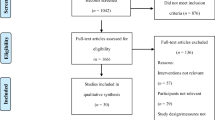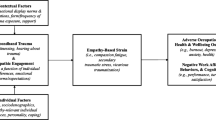Abstract
First responders may be exposed to intensely traumatic incidents, with the potential to result in adverse psychological and physiological reactions. Peer support programs have been employed to mitigate these potential effects. Critical Incident Stress Management (CISM) has been widely employed as a means of responding to emergency services’ stress responses. This incorporates the use of “Critical Incident Stress Debriefing” (CISD), a technique in which a facilitator helps the rescuer talk about their feelings regarding the incident. Inherent in CISD, psychological debriefing has been described as a brief crisis intervention usually administered within days of a traumatic event. Controversy has arisen over the use of psychological debriefing as a safe and effective tool for peer support. Organizations may be exposed to liability when offering “a practice that is not supported by the preponderance of the available scientific evidence.” Psychological First Aid has been described as an alternative modality, broadly endorsed by expert consensus, which can be readily learned and employed by peer support teams. “Listen, Protect, Connect” is an easy-to-remember means to summarize and approach the concept of Psychological First Aid.
Similar content being viewed by others
References
(IASC), I.-A. S. (2007) IASC guidelines on mental health and psychosocial support in emergency settings. IASC, Geneva
AAETS (n.d.) About the American academy of experts in traumatic stress. Retrieved from http://www.aaets.org/about3.htm
Bledsoe B (2003) Critical incident stress management (CISM): benefit or risk for emergency services? Prehospital Emergency Care, 272–279
Devilly G, Cotton P (2004) Caveat emport, caveat venditor, and critical incident stress debriefing/management (CISD/M). Australian Psychologist 39(1):35–40
Eifling K (2015) Evidence-based EMS: disaster scenarios and psychological first aid
Everly G (n.d.) A primer on critical incident stress management. International Critical Incident Stress Foundation. Retrieved from https://icisf.org/a-primer-on-critical-incident-stress-management-cism/
Everly G, Flynn B (2006) Principles and practical procedures for acute psychological first aid training for personnel without mental health experience. International Journal of Emergency Mental Health 8(2):93–10
Fox JH (2012) The effectiveness of psychological first aid as a disaster intervention tool: research analysis of peer-reviewed literature from 1990-2010. Disaster Medicine and Public Health Preparedness 247-252
Goldstein N, Gist R, McNally R et al (2001) Psychology’s response. Monitor on Psychology 32(10):4
Herrmann J (2006) Disaster mental health: a critical response. A training curriculum for mental health and spiritual care professionals in healthcare settings. University of Rochester, Rochester
Hobbs M, Mayou R, Harrison B, Worlock P et al (1996) A randomised controlled trial of psychological debriefing for victims of road traffic sccidents. BMJ 313:1438
IACP (2020) Employee mental health and wellness. International Association of Chiefs of Police from https://www.theiacp.org/sites/default/files/2020-05/Employee%20Mental%20Health%2005-06-2020.pdf
Krasnov V, Wessely S (2002) NATO-Russia advanced research workshop on social and psychological consequences of chemical, biological, and radiological terrorism. Belgium, Brussels
Laws T, Hawkins C (1995) Critical incident stress: a normal response to an abnormal situation. Australian Nursing Journal 2(7):32–34
Litz B, Gray M, Bryant R et al (2002) Early intervention for trauma: current status and future directions. Clin Psychol Sci Pract 9(2):112–134
McNally R, Bryant R, Ehlers A et al (2003) Does early psychological intervention promote recovery from posttraumatic stress? Psychological Science in the Public Interest 4(2)
Mitchel J, Everly G (1993) Critical incident stress debriefing (CISD): an operations manual for the prevention of traumatic stress among emergency services and dis-. Chevron, Ellicott City, MD
Mitchell J (1983) When disaster strikes...the critical incident debriefing process. JEMS 8:36–39
Mitchell JT, Everly GS (1996) Critical incident stress debriefing: an operations manual. Chevron, Ellicott City, MD
National Institute for Health and Care Excellence (NICE) (2018) Post-traumatic stress disorder. NICE guideline (NG116). London: NICE
National Institute of Mental Health (2002) Mental health and mass violence: evidence-based early psychological intervention for victims/survivors of mass violence. A workshop to reach consensus on best practices. Washington, D.C.: National Insitutes of Health, U.S. Government Printing Office
NSW Institute of Psychiatry and Centre for Mental Health (2000) Disaster mental health response handbook. NSW Health, North Sydney
Raphael B, Wilson J (2000) Psychological debriefing: theory, practice and evidence. Cambridge University Press, Cambridge, U.K.
Roberts N, Kitchinier N, Kenardy J et al (2009) Multiple session early psychological debriefing to prevent post-traumatic stress disorder. Cochrane Database of Systematic Reviews
Rose S, Bisson J, Churchill R, Wessely S et al (2002) Psychological debriefing to prevent post-traumatic stress disorder. Cochrane Database of Systematic Reviews
Shulz S, Forbes D (2014) Psychological first aid rapid proliferation and the search for evidence. Disaster Health 2(1):3–12
Szumilas M, Wei Y, Kutcher S et al (2010) Psychological debriefing in schools. Can Med Assoc J 182(9):883–884
van Emmerik A, Kamphuis J, Hulsboch A, Emmelkamp P et al (2002) Single session debriefing after psychological trauma: a meta-analysis. Lancet 360(9335):766–771
WHO (2003). Single-session psychological debriefing: not recommended. Geneva, World Health Organization
World Health Organization (2012). Psychological debriefing in people exposed to a recent traumatic event. WHO, Geneva
Additional Reading
Australasian Critical Incident Stress Association (1999) Guidelines for good practice for emergency responder groups in relation to early intervention after trauma and critical incidents (Glenelg Declaration)
Bledsoe BE (2002) CISM: Possible liability for EMS services? Best Practices in Emergency Services 5(6):66–67
Everly GS, Lating JM (2017) The Johns Hopkins guide to psychological first aid. Johns Hopkins University Press, Baltimore, Maryland
Jacobs GA (2016) Community-based psychological first aid: a practical guide to helping individuals and communities during difficult times. United Kingdom, Butterworth Heinemann, Oxford
Psychological First Aid: Guide for field workers (2011) Retrieved from http://www.who.int/iris/handle/10665/44615
Psychological First Aid (PFA) Minnesota Department of Public Health (n.d.) Retrieved from: http://www.health.state.mn.us/oep/responsesystems/pfa.html
The National Child Traumatic Stress Network [NCSTN] (2006) Psychological first aid (PFA) field operations guide: 2nd edition. Retrieved from: https://www.nctsn.org/resources/psychological-first-aid-pfa-field-operations-guide-2nd-edition
Schreiber M, Gurwitch R (2011) Listen, protect and connect: family to family, neighbor to neighbor. Retrieved from: https://www.ready.gov/sites/default/files/documents/files/LPC_Booklet.pdf
World Health Organization (n.d.) Psychological first aid: facilitator’s manual for field workers. Retrieved from: https://www.who.int/mental_health/emergencies/guide_facilitators_slideshow.pdf
Author information
Authors and Affiliations
Corresponding author
Ethics declarations
Conflict of Interest
The author declares that he has no conflict of interest.
Ethical Approval
This article does not contain any studies with human participants or animals performed by any of the authors.
Informed Consent
There were no individual participants precluding the requirement for informed consent to be obtained.
Additional information
Publisher’s Note
Springer Nature remains neutral with regard to jurisdictional claims in published maps and institutional affiliations.
Rights and permissions
About this article
Cite this article
Feuer, B.S. First Responder Peer Support: An Evidence-Informed Approach. J Police Crim Psych 36, 365–371 (2021). https://doi.org/10.1007/s11896-020-09420-z
Accepted:
Published:
Issue Date:
DOI: https://doi.org/10.1007/s11896-020-09420-z




